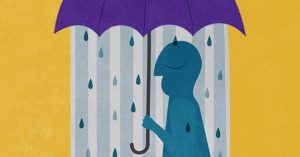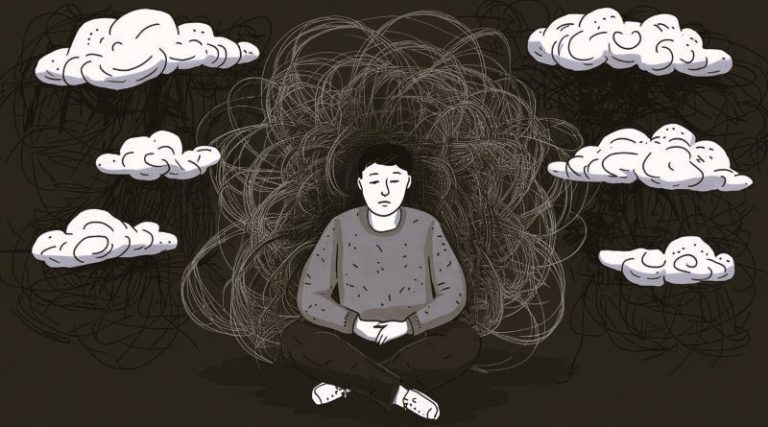By Tanja Taaljard / 07.27.2016
Could Bacteria, Parasites and Viruses Cause Depression?
Many people have, at some stage in their lives, experienced a period of depression. It seems that depression has become more common, and although certainly not new, its prevalence throughout human history is unknown. Winston Churchill suffered from periodic bouts of acute depression, which he referred to as his “black dog”. Charles Eisenstein describes it as a “mutiny of the soul.” For some, depression follows loss and grief. For others, it could be a chemical imbalance. Dr Stephen Ildari argues that, like many diseases, depression is a disease of civilisation, caused by a high-stress, industrialized, modern lifestyle that is incompatible with our genetic evolution.
On countering stress and depression, the Dalai Lama touches on this point (of our modern lives) when he says: “On the one hand, many of us live in societies that are very developed materially, yet among us are many people who are not very happy. Just underneath the beautiful surface of affluence there is a kind of mental unrest, leading to frustration, unnecessary quarrels, reliance on drugs or alcohol, and in the worst case, suicide.”
It seems that depression has become more common.
A cure for depression seems elusive. It is thought to be a combination of genetic, environmental, psychological and biological factors. Currently, treatment is based almost entirely on a symptom-based paradigm. Although more than a dozen different antidepressants in seven distinct classes are widely used to treat depression, there is no evidence that one drug is superior to another.[1] As more discoveries are made in the field of depression, treatment options improve. More recently, there has been a call for diagnosis based on biology, and not merely behavioural symptoms.
Dr. Turhan Canli believes that we are overlooking biological reasons for depression. Studies of inflammatory biomarkers in major depression strongly suggest an illness-related origin. He proposes that it may result from foreign invaders like parasites, bacteria or viruses that make their way into the body and cause changes in the brain.
Parasites, bacteria or viruses may cause changes in the brain.
Neuroinflammation
Inflammation is the body’s natural response to infection, injury or foreign invasion. Studies of patients with depression also show the presence of inflammatory markers in their brains. A person with depression often looks and acts sick. They experience loss of energy; they commonly have difficulty getting out of bed and lose interest in the world around them. Likewise, the symptoms of the flu or a bad cold are a reduced appetite, tiredness and sleeping a lot, increased sensitivity to pain and an altered mood. These behaviours are adaptive to make you rest, and to free up available energy to fight the infection. This state looks a lot like depression. Scientists have been studying these similarities, and what both conditions have in common is inflammation.[2].
Researchers are further exploring evidence suggesting that depression is possibly a fallout from an inflammatory response mounted by the body to deal with stress. “The analogy I make is that it’s an allergy to stress, that the body somehow perceives stress as being more dangerous than it is, and it mounts a much larger immune response to try to protect you from this stress, but as a result, you’re getting these symptoms that we associate with depression,” says Dr Georgia Hodes, researcher in neuroscience.
A person with depression often looks and acts sick.
What is causing the inflammation at a molecular level?
Dr Canli uses the example of a study that found a significantly positive correlation between the prevalence of a particular parasite across 20 different European countries, and depression. Of patients with a diagnosed major depression or bipolar disorder, those with a history of attempting suicide had higher levels of antibodies created to fight the bacteria. The infection is associated with markers of inflammation, as observed in depressed patients.
Infection due to parasites, bacteria or viruses is of course not the only way in which inflammation is set off. We don’t turn off inflammation entirely either, because we need it to ward off infections. A diet high in sugar and trans fats will encourage inflammation. Stress, particularly the kind that follows social rejection or loneliness, also causes inflammation. Some clinical trials have found that adding anti-inflammatory medicines to antidepressants improves symptoms and the response to treatment.[3] Omega 3 and the curcumin extract from turmeric have similar effects.
The bacteria in our gut is another way in which bacteria affects mood and behaviour. We have more than a thousand strains of bacteria in our intestines. Not only do we need them to digest food, they also play a role in our emotional well-being. Canli explains how people who have experienced negative emotions report improved mood when placed on a probiotic. It also reduces inflammation. In other words, good bacteria can lift your mood and bad bacteria could make you feel depressed.
The bacteria in our gut is another way in which bacteria affects mood and behaviour.
He also cites studies that have found links between viruses and depression. These included the Borna disease virus (BDV), the herpes virus responsible for cold sores, varicella zoster virus, which causes chicken pox, and Epstein-Barr virus, which causes glandular fever.
According to Professor Brian Fallon, a variety of infections have been associated with depression and other psychiatric disorders. He explains that the first microbe that was focussed on in this area was the bacterium that causes Syphilis. Today, the bacterium that is most likely to be a cause of depression is Borrelia burgdorferi, the agent of Lyme disease. “Patients with Lyme disease, for example, may become atypically irritable, agitated, or tearful at the least provocation. In addition, they may experience mood swings that may be misdiagnosed as a bipolar disorder. Viruses, such as HIV & Herpes Simplex, are also well recognised as agents of unusual neuropsychiatric and depressive states. In these cases, identification and treatment of the underlying infectious cause is clearly critical to improving the patient’s neuropsychiatric disorder.”
Infections have been associated with depression and other psychiatric disorders.
Hope For the Future
When Dr Canli was asked what depression treatment would look like in a world where we targeted a microbiome instead of brain chemistry, his answer was as follows:
“In more concrete, clinical terms, what it could mean for a patient is that if any of this were true, then at some point we might actually know what microoganisms to look for. The first thing that you might do when you see a psychiatrist and complain about depressive symptoms is that they might give you a blood test to see if you have any of those microorganism biomarkers, and they would treat you accordingly. This would be very different from the way it is now, which is trial and error.”














